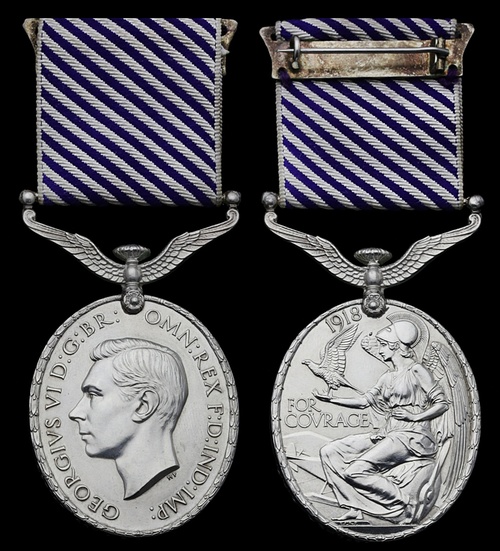
Auction: 20001 - Orders, Decorations and Medals - conducted behind closed doors
Lot: 751
A Second World War D.F.M. awarded to Wireless Operator and Air Gunner Sergeant A. S. Fletcher, No. 78 Squadron, Royal Air Force, later Royal Air Force Volunteer Reserve
Distinguished Flying Medal, G.VI.R. (975047. Sgt. A. S. Fletcher. R.A.F.), extremely fine, on its original investiture pin
D.F.M. London Gazette 23 December 1941. The original recommendation states:
'This Wireless Operator/Air Gunner has shown exceptional skill and unfailing courage, which have inspired his crews with confidence. This has contributed much to the success of the sorties in which Sergeant Fletcher participated.'
The particulars of meritorious service, dated 22 October 1941, add:
'This N.C.O. has carried out 4 Operational Sorties as 2nd Wireless Operator and 23 as 1st Wireless Operator. He has shown exceptional skill on operations and has always inspired his crews with confidence. He has undoubtedly contributed in large measure to the successful conclusion of his sorties.'
Alan Schofield Fletcher was born on 12 February 1917 at Macclesfield, Cheshire, the son of Thomas James Fletcher and Elizabeth Schofield, of Rochdale. Rather than follow in his father's footsteps and attest for the Lancashire Fusiliers, Fletcher enlisted into the Royal Air Force and was posted to No. 78 Squadron which was initially based at R.A.F. Linton-on-Ouse, followed by R.A.F Dishforth from 7 April 1941.
His first operational sortie involved a 5.35hrs bombing mission to Dusseldorf on 27 March 1941. This was followed by an attack on the docks at Kiel on 7 April, two attacks on Bremen and a sortie to the French Port of Brest, likely targeting the German Kriegsmarine capital ships Scharnhorst and Gneisenau. Further attacks focussed upon the naval armaments factories at Mannheim, the chemical, steel and iron industries at Duisberg at the Ruhr area, and the marshalling yards at Schwerte, followed by bombing sorties to Bremen and Munster on 5 July 1941. On a sortie to Hamburg a little over a week later, his aircraft developed engine trouble but the crew made it back to base safely. Following further missions over Frankfurt, Emden and Hamburg, his Whitley suffered similar complications in flight on 16 August 1941; forced the jettison its bomb load - likely over the North Sea - the aircraft crash landed, all crew escaping uninjured. Rested for a short period, Fletcher returned to the fray with further bombing sorties to Mannheim, Frankfurt and Warnemunde on 11 September 1941. The latter served as a favourite target for air attacks throughout the war owing to the presence of a Heinkel aircraft factory and its position as a major transit point from Germany to Denmark and Norway.
Fletcher was recommended for the D.F.M. having successfully completed 27 sorties totalling 191 flying hours. His award was published in the Rochdale Observer, a brief announcement also noting his address at that time as '1 Wellington Lodge, Littleborough'. A few days later, it was further reported that Fletcher had been seriously injured as a result of an accident and had been removed to hospital in the Midlands where his wife was attempting to join him:
'Sergeant Fletcher is 24 years of age. He was awarded the Distinguished Flying Medal in December last year after taking part in 28 flights over Germany. Before joining the Royal Air Force soon after the outbreak of the war he was a salesman at Electric House, Rochdale, and two years ago he was married to Miss Kathleen Barratt, elder daughter of Councillor William Barrett and Mrs. Barrett of 1 Wellington Lodge, Littleborough' (The Rochdale Observer, 31 January 1942, refers).
Following a period of convalescence, he eventually received the decoration from the hand of the King at an investiture held at Buckingham Palace in April 1942 (The Rochdale Observer, 2 May 1942, refers). Transferred to the Royal Air Force Volunteer Reserve, Fletcher was commissioned Pilot Officer in April 1944 and subsequently promoted Flying Officer, attached to the General Duties Branch, on 29 December 1944. His career came to an abrupt end however following the cessation of hostilities, when he was dismissed by sentence of General Court-Martial, effective as of 22 October 1945 (London Gazette 6 November 1945, refers). The particulars of dismissal require further investigation. Alan Schofield Fletcher later lived at Macclesfield and died on 16 July 1978; sold with copied recommendations and record of missions flown from AIR 2/9572.
Subject to 20% VAT on Buyer’s Premium. For more information please view Terms and Conditions for Buyers.
Sold for
£1,700
Starting price
£800




